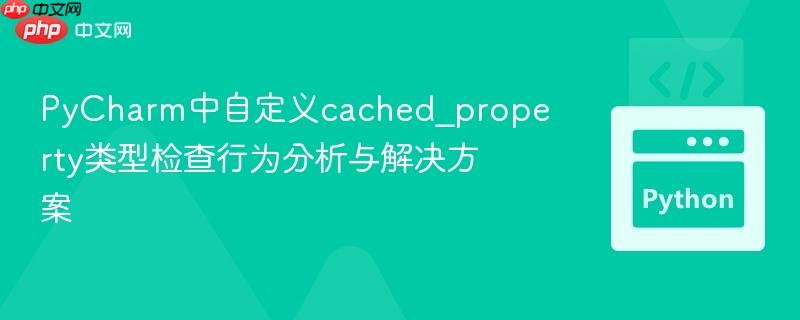
本文探讨了pycharm在处理继承自`functools.cached_property`的自定义描述符时的类型检查问题。与`mypy`的准确推断不同,pycharm似乎基于类名而非实际类型继承关系进行硬编码推断,导致其无法正确识别类型不匹配。文章提供了通过重命名自定义描述符为`cached_property`来规避此问题的解决方案,并分析了其局限性,建议开发者理解这一行为差异。
在Python开发中,类型提示(Type Hinting)和静态类型检查是提升代码质量和可维护性的重要工具。PyCharm作为一款强大的IDE,内置了静态类型检查功能。然而,在处理某些高级特性,特别是自定义描述符(Descriptor)时,其行为可能与标准类型检查工具(如mypy)存在差异。本文将深入探讨PyCharm在处理继承自functools.cached_property的自定义描述符时的类型检查行为,并提供相应的解决方案。
考虑一个自定义描述符result_property,它继承自functools.cached_property,旨在为类属性提供缓存功能,并支持更严格的类型定义。以下是其基本实现:
from functools import cached_property
from collections.abc import Callable
from typing import TypeVar, Generic, Any, overload, Union
T = TypeVar("T")
class result_property(cached_property, Generic[T]):
def __init__(self, func: Callable[[Any], T]) -> None:
super().__init__(func)
def __set_name__(self, owner: type[Any], name: str) -> None:
super().__set_name__(owner, name)
@overload
def __get__(self, instance: None, owner: Union[type[Any], None] = None) -> 'result_property[T]': ...
@overload
def __get__(self, instance: object, owner: Union[type[Any], None] = None) -> T: ...
def __get__(self, instance, owner=None):
return super().__get__(instance, owner)
def func_str(s: str) -> None:
print(s)
class Foo:
@result_property
def prop_int(self) -> int:
return 1
foo = Foo()
func_str(foo.prop_int) # 预期此处发生类型错误在这段代码中,Foo.prop_int被装饰为result_property,其返回类型被明确标记为int。随后,尝试将foo.prop_int(一个int类型的值)传递给期望str类型参数的func_str函数。
当使用mypy进行类型检查时,它会正确地报告一个类型错误:
tmp.py:38: error: Argument 1 to "func_str" has incompatible type "int"; expected "str" [arg-type] Found 1 error in 1 file (checked 1 source file)
这表明mypy能够准确地推断出foo.prop_int在实例访问时解析为int类型。然而,PyCharm 2023.2.3 (Community Edition) 的类型检查器却认为这段代码是正确的,没有报告任何错误。
这种差异表明PyCharm在处理自定义描述符的类型推断时,可能并非完全依赖于Python的类型继承和描述符协议的动态行为。相反,它似乎对一些特定的内置名称(如cached_property)进行了硬编码的类型检查逻辑。
为了验证这一点,我们可以创建一个名为cached_property的简单函数(而非一个完整的描述符类),并观察PyCharm的行为:
def cached_property(func): # 这是一个简化的、非标准的 cached_property 实现
def foo(self):
pass # 实际逻辑不重要
return foo
def func_str(s: str) -> None:
print(s)
class Foo:
@cached_property
def prop_int(self) -> int:
return 1
foo = Foo()
func_str(foo.prop_int) # 此时 PyCharm 报告错误令人惊讶的是,即使这个简化的cached_property实现并没有正确地返回被装饰方法的实际类型,PyCharm却能够识别出func_str(foo.prop_int)处的类型不匹配(例如,提示“Expected type 'str', got 'None' instead”,因为我们的mock cached_property内部返回None)。这强烈暗示PyCharm的类型检查逻辑是基于名称cached_property进行硬编码的,而不是通过分析其继承关系或__get__方法的完整签名来推断类型。
鉴于PyCharm的这一特性,一个直接的解决方案就是将自定义的描述符类命名为cached_property。这样,PyCharm的硬编码逻辑就会被触发,从而正确地进行类型检查。
以下是修改后的代码示例:
import functools
from typing import TypeVar, Generic, Any, overload, Union
from collections.abc import Callable
T = TypeVar("T")
# 将自定义描述符类命名为 cached_property
class cached_property(functools.cached_property, Generic[T]):
def __init__(self, func: Callable[[Any], T]) -> None:
super().__init__(func)
def __set_name__(self, owner: type[Any], name: str) -> None:
super().__set_name__(owner, name)
@overload
def __get__(self, instance: None, owner: Union[type[Any], None] = None) -> 'cached_property[T]': ...
@overload
def __get__(self, instance: object, owner: Union[type[Any], None] = None) -> T: ...
def __get__(self, instance, owner=None):
return super().__get__(instance, owner)
def func_str(s: str) -> None:
print(s)
class Foo:
@cached_property # 使用重命名后的描述符
def prop_int(self) -> int:
return 1
foo = Foo()
func_str(foo.prop_int) # 此时 PyCharm 将正确报告类型错误通过将result_property重命名为cached_property,PyCharm现在能够正确地识别出func_str(foo.prop_int)处的类型不匹配,并报告错误(例如:“Expected type 'str', got 'int' instead”)。
总而言之,当在PyCharm中遇到自定义描述符(特别是继承自cached_property)的类型检查行为不符合预期时,可以尝试将其类名修改为cached_property,以触发PyCharm内部的硬编码逻辑。同时,开发者应了解这种行为差异,并在需要严格类型检查时,结合使用mypy等外部工具。
以上就是PyCharm中自定义cached_property类型检查行为分析与解决方案的详细内容,更多请关注php中文网其它相关文章!

每个人都需要一台速度更快、更稳定的 PC。随着时间的推移,垃圾文件、旧注册表数据和不必要的后台进程会占用资源并降低性能。幸运的是,许多工具可以让 Windows 保持平稳运行。

Copyright 2014-2025 https://www.php.cn/ All Rights Reserved | php.cn | 湘ICP备2023035733号